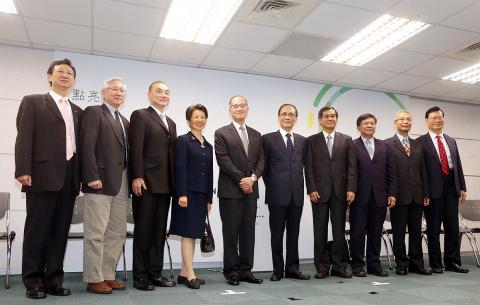Premier-designate Lin Chuan (林全) yesterday filled out his future Cabinet, including three ministers to handle national defense, foreign affairs and cross-strait relations, in preparation for the handover of power on May 20.
David Lee (李大維), a seasoned diplomat who is currently the representative to Australia, is to take over the foreign affairs portfolio, Lin said.
Lee, 66, holds a doctorate in foreign affairs from the University of Virginia. He has also served as the nation’s representative to the US, Canada and the EU.

Photo: CNA
Another experienced diplomat, Katharine Chang (張小月), 63, is to head the Mainland Affairs Council, the top government agency in charge of China policy, Lin said.
Chang is the chairperson of the Coordination Council for North American Affairs under the foreign ministry.
The Ministry of National Defense is to be headed by Feng Shih-kuan (馮世寬), a former air force general and former chairman of Aerospace Industrial Development Corp (AIDC, 漢翔航空工業), Lin said.
Feng recently accompanied president-elect Tsai Ing-wen (蔡英文) on a visit to AIDC, during which she said the company would play a very important role in the country’s national defense industry.
AIDC would focus on the research and development of advanced trainer aircraft, Tsai said.
Feng’s appointment underscores Tsai’s determination to push for the nation’s self-reliance in the production of aircraft and warships.
Tsai also named two new members of her incoming administration, Lin Bih-jaw (林碧炤), who is to serve as the Presidential Office secretary-general, and Democratic Progressive Party Secretary-General Joseph Wu (吳釗燮), who is to take up the post of National Security Council secretary-general.
Lin Bih-jaw, 67, has a doctorate in international politics from the University of Wales.
He has served as vice president of National Chengchi University and deputy secretary-general of the Presidential Office and the National Security Council.
Wu, 61, who holds a doctorate in political science from Ohio State University, is a former representative to the US.

CHAOS: Iranians took to the streets playing celebratory music after reports of Khamenei’s death on Saturday, while mourners also gathered in Tehran yesterday Iranian Supreme Leader Ayatollah Ali Khamenei was killed in a major attack on Iran launched by Israel and the US, throwing the future of the Islamic republic into doubt and raising the risk of regional instability. Iranian state television and the state-run IRNA news agency announced the 86-year-old’s death early yesterday. US President Donald Trump said it gave Iranians their “greatest chance” to “take back” their country. The announcements came after a joint US and Israeli aerial bombardment that targeted Iranian military and governmental sites. Trump said the “heavy and pinpoint bombing” would continue through the week or as long

TRUST: The KMT said it respected the US’ timing and considerations, and hoped it would continue to honor its commitments to helping Taiwan bolster its defenses and deterrence US President Donald Trump is delaying a multibillion-dollar arms sale to Taiwan to ensure his visit to Beijing is successful, a New York Times report said. The weapons sales package has stalled in the US Department of State, the report said, citing US officials it did not identify. The White House has told agencies not to push forward ahead of Trump’s meeting with Chinese President Xi Jinping (習近平), it said. The two last month held a phone call to discuss trade and geopolitical flashpoints ahead of the summit. Xi raised the Taiwan issue and urged the US to handle arms sales to

BIG SPENDERS: Foreign investors bought the most Taiwan equities since 2005, signaling confidence that an AI boom would continue to benefit chipmakers Taiwan Semiconductor Manufacturing Co’s (TSMC, 台積電) market capitalization swelled to US$2 trillion for the first time following a 4.25 percent rally in its American depositary receipts (ADR) overnight, putting the world’s biggest contract chipmaker sixth on the list of the world’s biggest companies by market capitalization, just behind Amazon.com Inc. The site CompaniesMarketcap.com ranked TSMC ahead of Saudi Aramco and Meta Platforms Inc. The Taiwanese company’s ADRs on Tuesday surged to US$385.75 on the New York Stock Exchange, as strong demand for artificial intelligence (AI) applications led to chip supply constraints and boost revenue growth to record-breaking levels. Each TSMC ADR represents

State-run CPC Corp, Taiwan (CPC, 台灣中油) yesterday said that it had confirmed on Saturday night with its liquefied natural gas (LNG) and crude oil suppliers that shipments are proceeding as scheduled and that domestic supplies remain unaffected. The CPC yesterday announced the gasoline and diesel prices will rise by NT$0.2 and NT$0.4 per liter, respectively, starting Monday, citing Middle East tensions and blizzards in the eastern United States. CPC also iterated it has been reducing the proportion of crude oil imports from the Middle East and diversifying its supply sources in the past few years in response to geopolitical risks, expanding